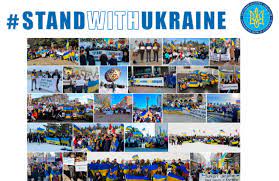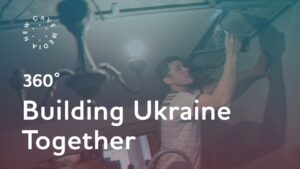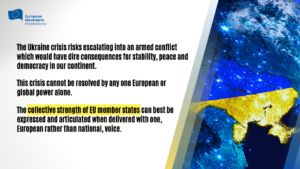On the eve of what could be a Russian invasion, Ukrainians appear united against the threat from Moscow — but also battling among themselves for political advantage in Kyiv. The political infighting is one more liability for a disorganized democracy up against a ruthless authoritarian state, The Washington Post’s David Ignatius reports.
Ukraine is long on patriotic fervor but short on internal organization — at once a vibrant democracy and a country manipulated by wealthy oligarchs. It’s “Western democracy” in its most disheveled form, he observes.
Alexander Vindman, the former director for European affairs on the National Security Council, sounded as if he shared [realist John] Mearsheimer’s historical analysis, that the NATO commitments to Ukraine had been a mistake, The New Yorker’s Benjamin Wallace-Wells reports. “We went too far, but not far enough. We said that they would eventually join, but we didn’t give them a map, which angered Russia but didn’t give the Ukrainians or Georgians the protections they need.”
 But he saw the Ukraine question in a different context: not as a distraction from a coming conflict with China but as a way to signal to other democracies that the United States would support them if they were menaced by authoritarian regimes. In Vindman’s view, “You can’t be progressive without believing, and buying into, the notion of supporting democracies.”
But he saw the Ukraine question in a different context: not as a distraction from a coming conflict with China but as a way to signal to other democracies that the United States would support them if they were menaced by authoritarian regimes. In Vindman’s view, “You can’t be progressive without believing, and buying into, the notion of supporting democracies.”
As some on the European Left attest, according to The Wall Street Journal.
“Nobody wants war. At first glance some on the left may be sympathetic to those siren voices who condemn Nato,” the Labour party leader Keir Starmer wrote in the left-wing Guardian. “But to condemn Nato is to condemn the guarantee of democracy and security it brings, and which our allies in eastern and central Europe are relying on, as the sabre-rattling from Moscow grows ever louder.”
Mr. Starmer was rebutting the British Stop the War Coalition led by, among others, former Labour leader Jeremy Corbyn, it adds. “At best they are naive; at worst they actively give succour to authoritarian leaders who directly threaten democracies,” he wrote. “There is nothing progressive in showing solidarity with the aggressor when our allies need our solidarity and—crucially—our practical assistance, now more than ever.”
If Washington, Berlin, and London had resisted the entreaties of the countries of Eastern Europe to join NATO, Russian forces would be banging at the doors of Poland and the Baltic states today rather than Ukraine, Stanford University’s Francis Fukuyama writes for American Purpose.
Democracy demands involvement
“We are investing in Ukrainian people who will change the rules of the game,” says Yuriy Didula, founder of Building Ukraine Together (BUR), Ukraine’s largest volunteer movement, and a partner of the National Endowment for Democracy (NED).
 300 houses damaged by war repaired, 80 volunteer camps that united Ukrainian people from different towns and cities, 35 youth centers all over Ukraine along with a network of thousands of volunteers who provide sustainable improvement to local communities, Bohdan Ben writes for Euromaidan Press. These are the results of one of the largest Ukrainian volunteer movements, Didula told Oksana Syroyid during the Lviv Security Forum.
300 houses damaged by war repaired, 80 volunteer camps that united Ukrainian people from different towns and cities, 35 youth centers all over Ukraine along with a network of thousands of volunteers who provide sustainable improvement to local communities, Bohdan Ben writes for Euromaidan Press. These are the results of one of the largest Ukrainian volunteer movements, Didula told Oksana Syroyid during the Lviv Security Forum.
“Democracy is something that needs constant involvement,” Didula adds. “Therefore, volunteering as a tool will never become irrelevant. That is, there will be no time when people in Ukraine will say: okay, volunteering is no longer needed.”
Oleksiy Danilov has couched this struggle, as have Biden and other leaders, as one between democracy and authoritarianism, adds Michael Weiss. One nation is choosing the difficult path of constructing a democracy under an ongoing state of siege, while the other is murdering, imprisoning or poisoning its opponents while also influencing and bribing accomplices abroad to look the other way, he writes for New Lines.
 “Some countries think Ukraine has a price,” Danilov says. “They focus on money instead of the principle of democracy. In Russia there are a lot of Germans, French and Austrians in management positions who used to be big officials in their countries. Now they work for Putin. Either he doesn’t have a very good HR department or it’s a slightly more complicated situation. I don’t know. I do know that 14,000 of my citizens have died already. And who killed them? Putin. For this, you have to respect him, as one German admiral said recently? You have to negotiate with him? What world do we live in?”
“Some countries think Ukraine has a price,” Danilov says. “They focus on money instead of the principle of democracy. In Russia there are a lot of Germans, French and Austrians in management positions who used to be big officials in their countries. Now they work for Putin. Either he doesn’t have a very good HR department or it’s a slightly more complicated situation. I don’t know. I do know that 14,000 of my citizens have died already. And who killed them? Putin. For this, you have to respect him, as one German admiral said recently? You have to negotiate with him? What world do we live in?”
Melinda Haring, deputy director of the Atlantic Council’s Eurasia Center, moderates a panel discussion on the humanitarian situation in Ukraine (above) with Michael Bociurkiw, nonresident senior fellow at the Eurasia Center, Aleksandr Galkin, director of Ukrainian human rights organization Right to Protection, Dr. Hryhoriy Nemyria, deputy head of Ukraine’s delegation to the Organization for Security and Cooperation in Europe (OSCE) and a member of parliament in the Verkhovna Rada of Ukraine, and Maria Tomak, head of the National Office of the Crimea Platform.
You can’t be progressive without believing, and buying into, the notion of supporting democracies, @AVindman tells @NewYorker‘s @benwallacewells #Ukraine https://t.co/wJeJOxFfTF via @NewYorker
— Democracy Digest (@demdigest) February 11, 2022







